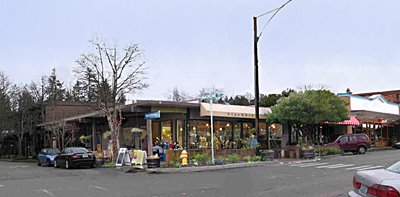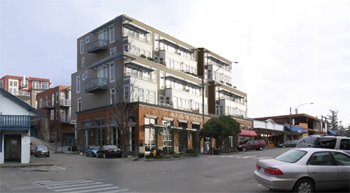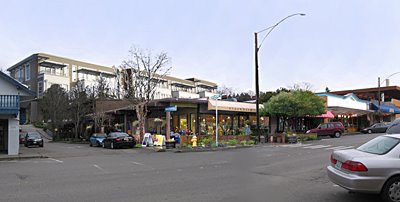After researching the City’s proposals and speaking with hundreds of our neighbors around the Island, the Save Winslow Way Coalition remains strongly opposed to much of the Winslow Tomorrow plan for the simple reasons that the citizens of Bainbridge Island do not need it, do not want it and cannot afford it.
Islanders have moved here or remained here because of the rural character and sense of place they have found. Many of us have fled urban canyons and suburban strip malls. Under the up zoning proposed by Winslow Tomorrow, developers will profit from this sense of place and the enviable lifestyle we have today, and in the process destroy those very things.
We don’t need to rezone an entire district to resolve a handful of specific issues. We can replace the deteriorated utilities, give T&C a variance to expand, add parking and improve our current zoning ordinances– all without adopting increased heights and density and without selling out to developers.
We can already accommodate projected growth, which may or may not occur, within our current heights and densities. And let us emphasize the uncertainty surrounding that growth. Contrary to what some have written on this page in recent weeks and months, the Growth Management Act (GMA) does not force communities to take new population, it requires planning for projected growth to protect critical areas in the environment and to ensure that infrastructure will meet future needs. Not only can we not predict market forces with any certainty, but we may also have legitimate and legal reasons for limiting growth in the future.
We rely solely on our aquifers for potable water. There have been increasing instances of declining well levels and salt-water intrusion. No one knows how much water we have. The GMA, our Comprehensive Plan and common sense dictate that growth must not occur without adequate water resources.
Islanders have expressed clearly through our Comprehensive Plan and surveys that we do not want to promote growth. An increasing number of homeowners have expressed concern about future water availability and the potential impact on the values of their homes. So why, in light of these facts, would we up zone for taller denser buildings decades before the demand for increased density might arise?
And then there are the costs. The City has acknowledged a price tag of at least $100 million to pay for Winslow Tomorrow projects. Some experts have suggested that we may be looking at much more. Taxpayers can only afford so much to fund all of our community needs. What will we decide when asked to choose between Winslow Tomorrow projects and our Schools, Open Space, Affordable Housing, Parks, the Fire District…Financial commitments of this magnitude must be made only within the context of a complete understanding of the current and future needs of the entire community.
A significant aspect of the Winslow Tomorrow plans that has received little public attention is the selling of density bonuses to developers. The City claims that the monies collected will be used to fund open space and affordable housing and other amenities elsewhere in the Winslow Core, and yet it seeks to implement this program without having secured any land on which to create these essential public amenities. Somehow the opportunity to purchase Government Way, a large property ideally located for the provision of any number of public amenities, slipped past our City officials even as they plan to implement this bonus program.
Winslow Tomorrow began with a set of goals that mirrored those shared by most of the community. Unfortunately, the proposals developed to implement Winslow Tomorrow are not “green”, not “sustainable”, do not “preserve the community’s character”, nor “protect the environment” and as such they do not in fact embody that laudable vision.
We should expect a plan for Winslow that retains the small town character and scale of our “Main Street”, even as denser construction occurs around and behind Winslow Way. We can insist on responsible planning that requires tree retention and planting, sustainable building practices, proper stormwater treatment and public transportation. We must have a guarantee of future water availability before additional demand can be permitted. All of this and more is possible, but only if we all speak out and make ourselves heard.
Saturday, June 9, 2007
Subscribe to:
Post Comments (Atom)
Downtown Winslow Today

Blackbird Bakery at Winslow Way and Madrone
Winslow Tomorrow?

A new 55 foot building replaces Blackbird Bakery
A Better Way

Putting height and density behind, and preserving the character and scale of our main street

No comments:
Post a Comment